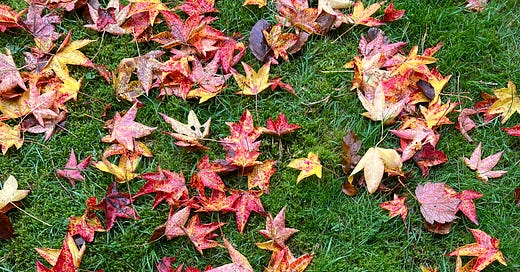hello,
I’m wending my way to a wedding in Devon and I stopped by one of my favourite places to catch autumn at Westonbirt Arboretum. The leaves are falling so if you’re at all nearby, don’t hesitate! Like many things, it’s probably best experienced as early or as late in the day as possible.



Paid subscriptions help keep the lights on (essential when the clocks go back) and they also contribute to work like the boys’ literacy project, the results of which I’ve outlined below.
the books📖
It’s been a bit of an inbetween, strategising kind of week, meeting and greeting about the place and planning next projects.
The two big big bits of news work-wise are that I might have actually found an agent I can work with! Our meeting felt more bespoke and personal than some of the other conversations I’ve had in this space and their skillset seems to complement mine nicely. This would be a big breakthrough as pitching and dealing with clients is a lot of work and alongside this labour-saving functionality, this one would help me generally up my game too. I’m feeling optimistic here.
Then our little boys’ literacy crew met up one evening in a west London public house to sum up the state of the nation’s literacy. I was quite shocked at the state of play and how much interest we’ve had come in from the work we’ve done so far. In some ways, I’ve underestimated the problem and how impactful the work we’ve done already and while I’ll keep my powder dry for a longer, better-informed piece on the matter, I’ll explain a little on our results below.
for your interest
boys and books, a right delight and on achievement
boys and books
When a teacher from a £60k per year private school is asking for help with their boys reading programme, you know something is not right.
It seems something is not right in the state of Britain across the whole reading journey. From childhood to adulthood, boys’ relationship to reading is much more fraught than girls and while a longer piece will happen, now I’m going to outline in basic terms what our boys’ literacy initiative has achieved over one academic year:
The gender achievement gap closed by 1/3
Boys do worse at school than girls. Why this is accepted as a fact seems strange to me but the broader issue is something I don’t know enough about.
The boys who attended my reading-related sessions saw their results across all their subjects improve by a significant amount in relation to the girls.
Greater uptake of A level language and literature by boys
Not only did the boys do better with their schoolwork, more of them elected to continue English to A-Level. This is perhaps related to the next point!
Boys that attend the program reported wanting to read for pleasure
One boy in this year’s cohort said after our first session that he’s begun going to bed 30 minutes earlier each night so he can read in bed. This sort of detail makes me so happy and it turns out that many of the boys have become more interested in reading for its own sake (and prepared to admit it).
Improved attendance
The teachers are relatively convinced that the program, and here it has to be said that the literacy sessions are not the only sessions, have contributed to the boys attending more of their classes than before. They’re still working the data on this one but it feels related to the next point.
Boys that attended literacy program were more open to further educational intervention that led to increased academic attainment
Teachers reported that the boys were more willing to engage with teachers when they had general points to make about their studies. The success of the literacy sessions and the increase in the perceived value of reading acted as evidence for the teachers that they had valuable things to say to the boys about their academic endeavours in general and that they had their best interests at heart. The sessions helped to build trust between students and teachers, enabling further academic development and increased harmony in the student-teacher relationship.
My theory, and it’s one borne out by our results, is that instilling a sense of curiosity and enthusiasm around reading books is a rising tide that lifts all boats. I’ll go into the methods another time but one important point is that it’s not a test. It’s not necessarily about being right.
a right delight
Rory Sutherland is one of my favourite thinkers and he offers a thought experiment.
What if the brief to design a new train connection was given to Disney instead of railway engineers?
Railway engineers, or the consultants he seems to deplore, would focus on Brailsford-style ‘marginal gains’ like speed, efficiency, capacity. In theory, this is ‘the right’ thing to do. The train would arrive slightly faster, with slightly more people but the cost of these incremental gains are, in the UK, enormous, as are the consultancy fees. Does that end justify the (billions of ) means? It’s unlikely.
Sutherland’s solution is to make the train more fun than the other options. What if you were delighted to get the train? Would it be more comfortable, better lit, have some wifi that worked, have a bar car? Would it look like an old choo choo train and have Goofy checking your ticket?
I jest of course, but it is a good question to ask yourself in general; what would this be like if it was fun? Sutherland says that turning questions ‘into optimisation problems with a single right answer’ makes everything simpler but takes away human psychology and eventually delight, in the pursuit of being right by numbers which no one can blame you for if it goes wrong.
When I’ve ground to a halt work-wise recently, I’ve often realised that I’ve lost the fun a bit. I’ve been prioritising doing the ‘right thing’ and it’s sort of backfired. Funnily enough, when I’ve reintroduced the odd bit of noodling on a novel draft back into the mix I’ve suddenly become much more generative in other aspects of my work.
When it comes to convincing boys of the value of books, that’s really where it lies. You can justify it to them with all the numbers, the stress reduction and the promise of improved financial prospects (actual side effects of reading), but it’s the fun, the care and the delight you need to show them.
on achievement
Could this be the pattern of my life ahead? Every ambition thwarted, every dream stillborn? But a second’s reflection tells me that what I’m currently experiencing is shared by all sentient, suffering human beings, except for the very, very few: the genuinely talented – the odd, rare genius – and, of course, the exceptionally lucky swine.
Our book club pick Any Human Heart by William Boyd presents us with Logan Mountstuart, a precocious, somewhat arrogant schoolboy you can’t help but find endearing, whose life meanders through all sorts of happenings and locales to its eventual conclusion. The book is presented as a collection of journals, within which he wonders that,
I never really expected my life to be like this, somehow. What happened to those youthful dreams and ambitions? What happened to those vital, fascinating books I was going to write?
He suffers a multitude of mini ego deaths along the way, the hubris of each of his younger selves fading into the march of time as the book progresses through his life. In a similar vein, a friend recently reflected on his sporting career, saying he realised most of his ambitions, including playing at the top level, buying a nice car, dating models and having all his designer tracksuits hanging in his closet, but that he felt the same as before (even if he does actually really like the tracksuits). He did get what he wanted and realised the achievement of his aims made no difference to his sense of self. Now he’s taking another, more inwardly focussed line of enquiry.
I enjoyed this interview with Father John Misty where he explained the appeal of chasing status in all its forms. Success promises the feeling that, ‘If I can achieve this, I never have to learn anything again’, only to yank the rug out from under you each time you hit a milestone and feel the same as before. Logan Mountstuart, despite his protestations, does come to achieve a fair few things over the course of Any Human Heart, but you realise that they are sort of not the point. His life in all its totality and its subjectivity to chance, is the point.
One of our book club attendees spoke about reading his old journal upon finishing Any Human Heart and finding himself moved to tears by an experience he recorded aged 19. His past self felt this memory would be important and his feelings came back instantly. The memory wasn’t a good one or even anything to do with him. It was something external, it happened to someone else and it was no achievement but it moved him years afterwards.
Listening to this man share his memory with us was a wonderful experience and this week, I’ve learned there are two things that will stay with you long after their initial glow has passed dimmed.
Memories and tracksuits.
a book
I’ve not finished anything this week but I have a thought-provoking piece from the FT to share with you. Naoise Dolan’s exploration of ‘How George Orwell became a dead metaphor’ will give you plenty to think about, whether you agree or disagree with her thesis.
a listen
I’ve been having a lovely time listening to The Lion, the Witch and the Wonder by author Katherine Rundell, five short audio essays on the power and politics of children’s fiction. It’s a the sort of series you’d like to listen to and then read.
a quote
I will admit, under duress, to being a writer.
– Naoise Dolan
lastly
Thanks for reading! My work is made possible by you so if you’d like to support me you can buy my books, hire me to do something or you can become a paid subscriber using the button below.
If you want to help me out for free, you can share this letter with someone who might enjoy it, either on social media or by directly sending it to them using the button.
I’ll see you next time.



